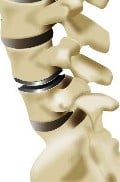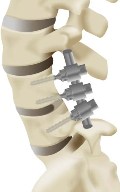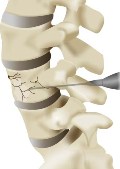Neck and back pain is so common it’s regarded as almost normal. More than eight in every 10 people experience it at some point in their lives.
Despite this, only 2% of the thousands of South Africans who’re treated for neck and back pain every year actually need back operations.
So when your specialist says you need back surgery, how do you know it’s the best option? What kind of operation will help? What does it involve? And will your medical aid pay up?
These are some of the questions you’ll need answered if you’re to undergo a procedure.
There are only five cases where a back operation is the only answer – and if you’re not experiencing one of these five problems you don’t need surgery.
If you do fall into the 2% of people who need a back or neck operation, chances are it will involve only small incisions in your back and you’ll recover much faster than used to be the case with these kinds of operations. Thanks to new and innovative techniques there has been a revolution in back and neck surgery.
In fact, the relevant technology is developing so fast existing spinal products are replaced by new versions every 18 months on average. It has become a worldwide, billion-rand industry with fierce competition. Sometimes doctors are under huge pressure from manufacturers to use new products.
There are also cases where patients demand the doctor performs the surgery because back operations are now less traumatic than a decade or two ago. Of course, more people need back surgery nowadays – mostly because people are living longer and their backs take more punishment.
Read the info below before resorting to a back or neck operation...Five cases where a back op is the only option:
- If there’s a pinched nerve in the back or neck and other treatment didn’t work.
- If there’s extreme pressure (compression) on the spine.
- If the vertebrae are too far apart and there’s so much movement it threatens the spinal cord.
- If neck or back pain is accompanied by nerve damage. If you can’t move an arm or leg you definitely have nerve damage. The warning signs for nerve damage are: pain that radiates down your legs or arms; numbness, weakness or tingling in your arms or legs; inability to lift your arms or legs; or loss of bladder or bowel control.
- If the pain affects your quality of life.
If you answer "yes" to all these questions, there’s a good chance surgery could improve your life.
If you answer "no" (and 98% of all people with back or neck pain would) your back pain can be treated with medication, stretches, physiotherapy and learning the right ways to sit, bend, sleep and so on.
Progress in the field
Do you think a back operation means long incisions down your spine, months of lying flat on your back and wearing a special back brace? If so, you’re in for a surprise.
The breakthroughs and new technology have in the past 20 years changed the face of back surgery. The pain, discomfort, bleeding and tissue damage involved aren’t nearly as bad as they were years ago.
Here’s what doctors can do these days:
- Using keyhole surgery, small incisions (between 2 and 5 cm) are made. Through these tiny holes the part of a damaged disc that’s pressing on a nerve is cut away or the entire disc is removed and replaced with a titanium one. Modern optical navigation computer technology shows the surgeon exactly where to cut so he can work precisely even though the whole area hasn’t been exposed.
- Titanium struts can be used to separate vertebrae that have collapsed onto each otherand have trapped nerves between them. Fusions are done less frequently because they render the back or neck less mobile.
- Best of all, in some cases doctors can simply inject new material into the vertebrae or disc. Special bone cement can be injected into a vertebra that’s cracked or broken as a result of osteoporosis. The bone cement hardens within 20 minutes and relieves most of the pain. With these new techniques both the operation and the recovery time are a lot shorter. Titanium discs also help recovery along because they allow the spine to remain flexible and mobile. And they last longer than the chrome discs used in the past. Whereas normal recovery time used to be between three and six months, we’re now looking at just one to six weeks.
Spine implant
Collapsed disc
Spinal fusion
Injection of bone cement
But...
The costs of spinal products and operations are exorbitant because all products must first go through expensive tests to make sure they’re safe. Doctors also have to pay high import duties.
Titanium, the material most commonly used in neck and back operations, is worked in South African mines but the ore is processed overseas.
The right operation for every problem
Your guide to treating back and neck pain
What should you do about which pain? And if you need an op, what are the available procedures? We’ve put together a guide to help you determine what could work for you.
Specialists divide back and neck problems into four main groups:
- Neck or back pain without arm or leg pain
- Neck pain with accompanying arm pain; back pain with accompanying leg pain
- Back pain with bladder problems
- Back pain as a result of a broken vertebra, tumour or illness
Medical aid coverage - Who pays?
Who pays for your back operation? Will your medical scheme cover it?
Choose the right surgeon
Orthopaedic, spinal or neurosurgeon – how do you choose?
Are you prone to back problems?
Your genes could be the reason for your bad back.
How to prevent back problems
Take steps to prevent back problems. Adapt your lifestyle to prevent early deterioration.
- (Health24.com)




 Publications
Publications
 Partners
Partners















